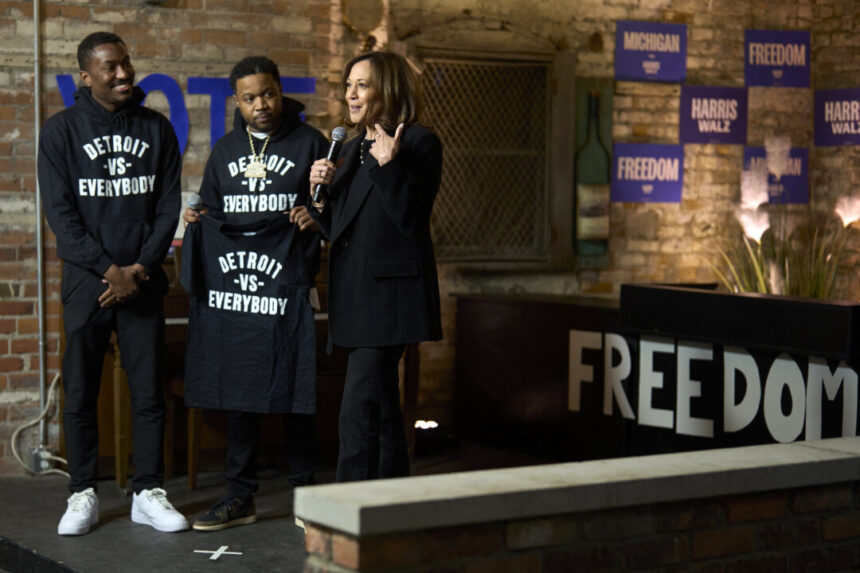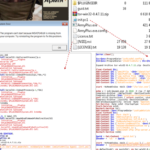Harris spent an hour taking tough questions and defending her record as a prosecutor, senator, and vice president.
As recent polling shows an increasingly narrow race between the two presidential candidates, Vice President Kamala Harris is on an interview blitz, including an Oct. 15 audio town hall on the “The Breakfast Club” radio show.
Hosted from Detroit in battleground Michigan, the one-hour exchange featured tough questions from listeners. Harris defended her record as a prosecutor, senator, and vice president, while emphasizing policies directed at the black community.
Here are four takeaways from Harris’s appearance.
‘Progressive Prosecutor’
One early criticism of Harris by former President Donald Trump and his running mate, Sen. JD Vance (R-Ohio), was that she seemed to avoid interviews and media appearances to dodge tough questions.
Right out of the gate, Charlamagne asked Harris about the allegations that she locked up thousands of black men in San Francisco for marijuana violations “to boost your career.”
“Some say you did it out of pure hate for black men. Please tell us the facts,” Charlamagne said.
Harris said it wasn’t true. “I was the most progressive prosecutor in California on marijuana cases and would not send people to jail for simple possession of weed.”
Some of the former lawyers in her office told the Bay Area News Group that most who were arrested for low-level marijuana possession never saw time behind bars, with just a few dozen being sent to state prison while Harris was DA.
Harris promised to “work on decriminalizing” marijuana as president, and said that the plant’s federal prohibition “disproportionately impact[s] certain populations, and specifically black men.”
Reparations
Some recent polls, including one from the National Association for the Advancement of Colored People (NAACP), showed that 63 percent of black voters support Harris, with 13 percent backing Trump. In 2020, President Joe Biden earned 92 percent of their vote.
One listener asked if the timing of her proposals was political.
“I’ve been in this race about 70 days,” Harris replied. “What I’m talking about right now is not new and is not for the sake of winning this election. This is about a longstanding commitment.”
Another listener asked Harris if she supported reparations for slavery.
“On the point of reparations, it has to be studied,” Harris said, while spending much of her seven-minute response noting her economic policies for black voters.
“There’s no question [reparations have to be studied]. And I’ve been very clear about that position.”
“I think what is happening is that we are all working on reminding people of what is at stake, and that is very important,” Harris said, while touting her support from more than 200 Republicans from past administrations.
Not Scripted, but ‘Disciplined’
Charlamagne opened the interview by mentioning criticisms often coming from Trump and other Republicans.
“Folks say you come off as very scripted, they say you like to stick to your talking points,” the host said.
Harris replied that she viewed that as “disciplined,” prompting Charlamagne to clarify.
“Some people say you have an inability to fearlessly say who you are and what you believe,” he said. “What do you say to that criticism, and is it fearful?”
Harris first complimented actor Maya Rudolph’s portrayal of her on Saturday Night Live—which satirizes some of the vice president’s speaking style—before defending her rhetorical approach, which she said requires repetition.
“The reality is that there are certain things that must be repeated to ensure that I have everyone know what I stand for and the issues that I think are at stake in this election,” Harris said. “You know, some people say that until someone has heard the same thing at least three times, it just doesn’t stay with you.”
She admitted that she uses similar speeches throughout her battleground state rallies “to make sure that people hear and receive what I think are some of the most critical issues that are at stake in this election.”
Pressed on Border Policy
Charlamagne asked Harris if the Biden administration bears some blame for the issues at the southern border, asserting: “The first three years, y’all did get a lot of things wrong with the border.”
Harris said the administration’s first act after inauguration was to propose a bill to “fix the broken immigration system.” The U.S. Citizenship Act of 2021 would have created new citizenship pathways for immigrants.
Harris then pivoted to touting border policies implemented in 2024, years after illegal border crossings began to surge.
“We then tightened up the asylum application process. We then worked with what we needed to do to secure ports of entry. We did a number of things,” she said, while reiterating her support for the failed bipartisan border bill and her position that it is Congress’s job to fix the immigration system.










